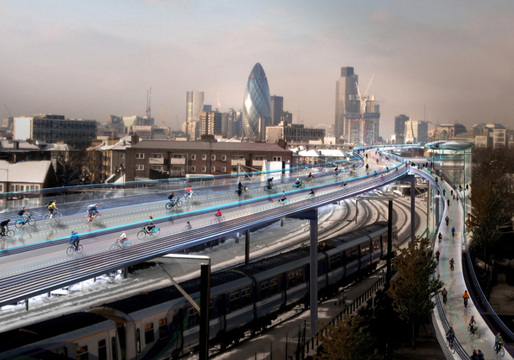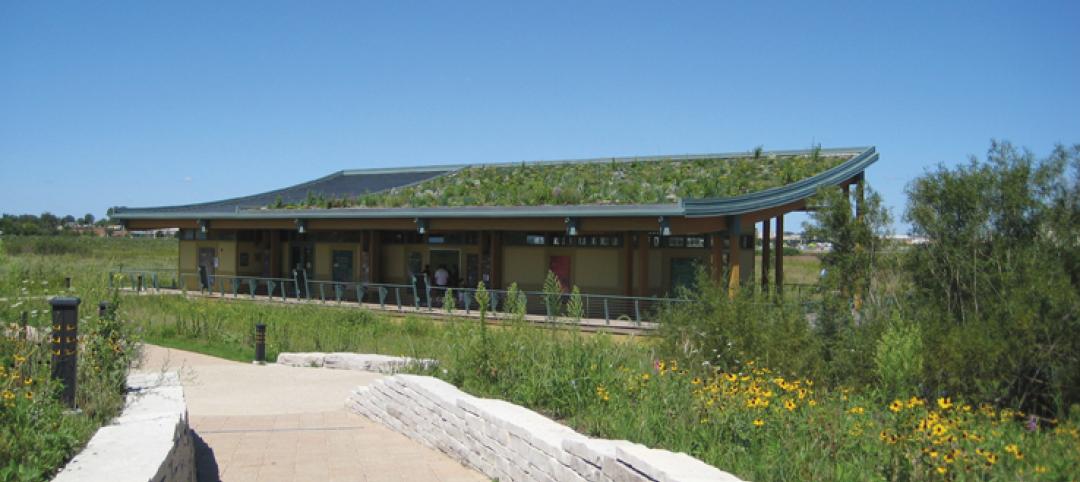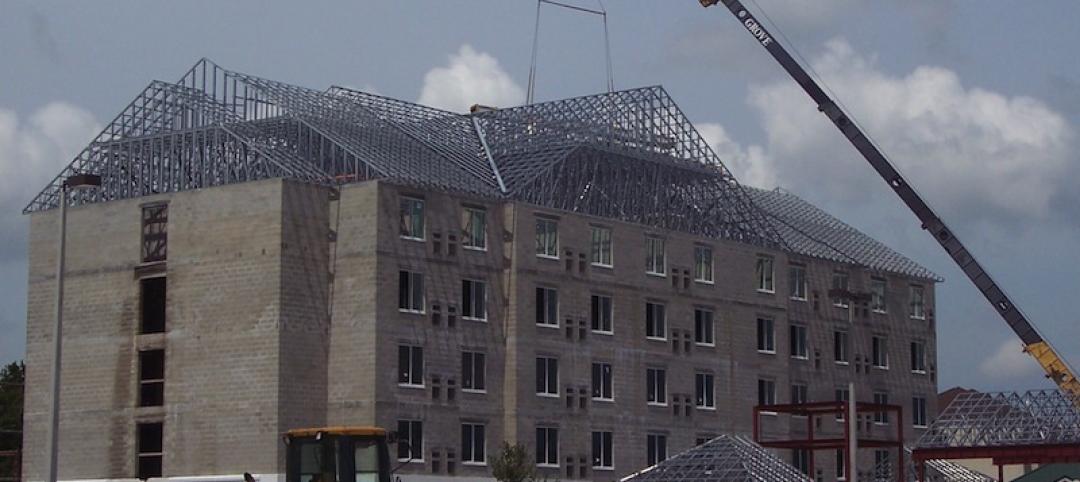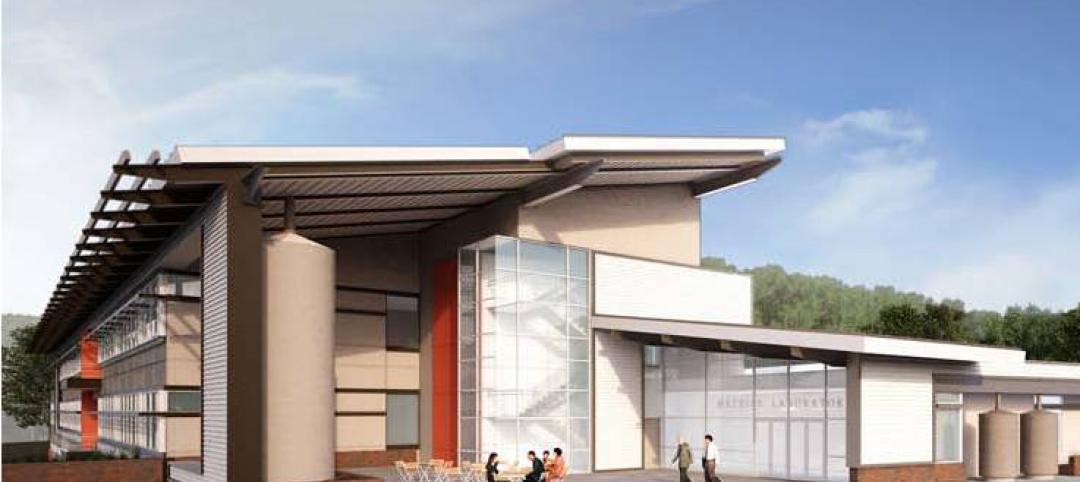Exterior Architecture, Foster + Partners and Space Syntax—a team who share Lord Foster’s passion for the benefits of cycling—have jointly developed SkyCycle, a new approach to transform cycling in the capital. Following existing suburban railway corridors, a wide, secure deck would be constructed above the trains to create new cycle routes throughout London.
The proposed SkyCycle network follows existing suburban rail services and provides over 220 kilometres of safe, car free cycle routes which can be accessed at over 200 entrance points. Almost six million people live within the catchment area of the proposed network, half of whom live and work within 10 minutes of an entrance. Each route can accommodate 12,000 cyclists per hour and will improve journey times by up to 29 minutes.
The Mayor’s aim is for London to be the best major city in the world. However, the capital’s transport network is at capacity and faces the challenge of population growth of 12 percent over the next decade. The government has committed to investment in transport, through airport planning, high-speed rail, Thameslink and Crossrail. The Mayor’s transport strategy also seeks to address the needs of pedestrians and cyclists in the city’s crowded streets and in areas where the public realm is poor.
The environmental and health benefits of cycling notwithstanding, the bicycle is a more efficient use of London’s limited space – we believe there is a pressing need for network modelling of new capacity for these active, self-determined modes of transport.
The SkyCycle approach is revolutionary, and has potential applications in cities around the world. Applying lateral thinking, Britain’s engineering expertise and investment in transport technology could lead to the creation of an efficient platform building system.
As London’s railway lines were originally built for steam trains, they follow contours that naturally reduce the amount of energy expended and avoid steep gradients. SkyCycle exploits this historic legacy. Associated benefits include the regeneration of the typically low value, often underutilised industrial sites next to railway lines; vertically layering the city to create new social spaces and amenities on these cycling high streets; and the integration of automated goods delivery networks.
Early studies of a SkyCycle system indicate that it provides capacity at a much lower cost than building new roads and tunnels. The possibility of the deck providing development opportunities for businesses along the route, particularly where it intersects with stations and bridges, has also been the subject of the study, exploring ideas for public/private commercial growth and regeneration.
The SkyCycle study team will continue to further develop these scenarios, and the project has already been presented to the GLA, TfL and Network Rail, as well as to developers and contractors with specialist rail experience.
Lord Foster stated: "Cycling is one of my great passions – particularly with a group of friends. And I believe that cities where you can walk or cycle, rather than drive, are more congenial places in which to live. To improve the quality of life for all in London and to encourage a new generation of cyclists, we have to make it safe. However, the greatest barrier to segregating cars and cyclists is the physical constraint of London’s streets, where space is already at a premium. SkyCycle is a lateral approach to finding space in a congested city. By using the corridors above the suburban railways, we could create a world-class network of safe, car free cycle routes that are ideally located for commuters."
Sam Martin & Oli Clark of Exterior Architecture Ltd: "SkyCycle is an urban cycling solution for London. A cycling utopia, with no buses, no cars and no stress. We are incredibly excited at how together with Foster + Partners our idea has been developed and now more recently turned into a truly world changing scenario by Space Syntax for revolutionising cycling in London and possibly the world."
Anna Rose, Space Syntax: "Space Syntax is delighted to be developing the SkyCycle concept with Exterior Architecture and Foster + Partners. At crucial points in London’s history major infrastructure projects have transformed the fortunes of the Capital: for example, Bazalgette’s sewer system helped remove the threat of cholera to keep London at the forefront of the industrial revolution; the Underground strengthened London’s core by making long-distance commuting possible. SkyCycle is conceived in this tradition as a network of strategic connections from the suburban edges to the centre, adding the much needed capacity for hundreds of millions of cycle journeys every year with all the social, economic, environmental and health benefits to London that follow. Space Syntax is evaluating these impacts, using a new generation of transport model to analyse cycle movement."
A spokesman for Network Rail said: "We welcome the proposals which have been put forward by Foster + Partners and Exterior Architecture and are always happy to look at ways we can contribute to improving travel and transport in London. We will continue to liaise with all involved as the aspiration for this innovative scheme develops."
Related Stories
| May 25, 2011
Low Impact Development: Managing Stormwater Runoff
Earn 1.0 AIA/CES HSW/SD learning units by studying this article and successfully passing the online exam.
| May 25, 2011
Register today for BD+C’s June 8th webinar on restoration and reconstruction projects
Based on new and award-winning building projects, this webinar presents our “expert faculty” to examine the key issues affecting project owners, designers and contractors in case studies ranging from gut renovations and adaptive reuses to restorations and retrofits.
| May 25, 2011
Hotel offers water beds on a grand scale
A semi-submerged resort hotel is the newest project from Giancarlo Zema, a Rome-based architect known for his organic maritime designs. The hotel spans one kilometer and has both land and sea portions.
| May 25, 2011
Smithsonian building $45 million green lab
Thanks to a $45 million federal appropriation to the Smithsonian Institution, the Smithsonian Environmental Research Center in Edgewater, Md., has broken ground on what is expected to be one of the most energy-efficient laboratories in the country. The 69,000-sf lab is targeting LEED Gold and is expected to use 37% less energy and emit 37% less carbon dioxide than a similar building.
| May 25, 2011
World’s tallest building now available in smaller size
Emaar Properties teamed up with LEGO to create a miniature version of the Burj Khalifa as part of the LEGO Architecture series. Currently, the LEGO Burj Khalifa is available only in Dubai, but come June 1, 2011, it will be available worldwide.















